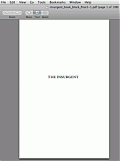
Noah Cicero
The Insurgent
Clarice Lispector led me to Noah Cicero. Which is strange considering they have little else in common besides having written books. I arrived at Noah’s site offering his latest book for review. I bit. The Insurgent, it’s a catchy title anyway.
I read this book while sitting before a laptop’s glowing screen, which is unusual for me and not as bad as I had thought. I read this book with anterior motives: to read what someone my age is writing and getting published. This is Noah Cicero’s fifth book, his first one was quite well received. He’s from Youngstown, which I imagine to be something like Flint or an enormous and racially diverse Howard City.
Now, onto the book!
The Insurgent is divided in two. Each rather small slice is called a book in itself, One and Two. Each book has chapters like many books do. In the chapters there are paragraphs, paragraphs that span a mere line. Why this should be difficult for me to accept, I don’t know. But it was. I felt like The Insurgent was written for short attention spans, or for the Internet. While reading, the shortness distracted me, I kept expecting: Isn’t there more?
More what? More explanation, anything. I kept waiting for subtlety and poetry. But that’s just me, wishing for some faintgusting breeze to decimate Vasily inextricably. No. The starkness of the text is the starkness of Vasily’s life and the starkness of the downtrodden residents of Youngstown. There is a hopeless stupor which seems to have hypnotized the characters into thinking that pain killers and suicide is the only way out. Life is filled with sorrow and suffering and those at the bottom or those on the outside like Vasily and Chang, understand that.
I have no life.
Neither do they, but they have convinced themselves they do.
And that’s the difference between them and me.
Vasily broods. Vasily wants to kill himself. Vasily despairs he will never again get laid. Vasily sees the striking difference between himself and those who find the acquisition of Nikes over Adidas important. Vasily washes dishes. He wants to kill himself. He watches Youtube videos about global warming, goes to the Waffle House, the strip joint, the bar. Vasily wants to kill himself. Why? The emptiness? The striking difference between him and everyone else? His outsider tendencies? Youngstown? Because he’s Russian?
Vasily reads. He knows who Herr Nietzsche is, Monsieur Rimbaud and Monsieur Sartre. Shouldn’t that help him get above arm-dragging self-abnegation? I believe it must, because what more could great works do: they make you think, they allow you to see beyond one’s measly point on the globe to see existence cosmically.
Hints at life existing outside Youngstown rarely arise. There is a stifling effect here, as if what brews in that city, in its abandoned steel mills, in its people and streets, one can never truly shake. For when in Book Two Vasily heads out to the proverbial West, and in between his revelations in Nature, he can’t help but to meet up with people from Youngstown.
What is more human than suffering? Everyone suffers alone, but suffering we share none-the-less. Vasily seems to suffer because he can’t see his way out and he can’t see his way out because he is suffering. This is a similar story to Nexus, with Henry Miller’s torments being more explicit and clearly cut. I just couldn’t figure it out: What is Vasily suffering for? Only when Vasily finally found himself free of Youngstown and its people, free while clutching a wad of cash deus ex machina, Vasily began to smile. And alas! suicide’s repetition died down.
Which brings me back to the title that I figure must be an ironic one, unless insurgency counts as the violent act of beating a drunk “stereotypical Republican.” If not, then Vasily must be claiming insurgency against Youngstown’s common thinking: instead, flee into Nature with a big wad of cash. No, this is no Civil Disobedience. I think I will henceforth call this book The Self-Loather.
I can’t end it on such sour notes, I finished the book after all. There was good writing that held me to it and an interesting array of characters, albeit my wish to reach through the text and shake them.
· · · · · · · · · · · · · · · · · · · ·